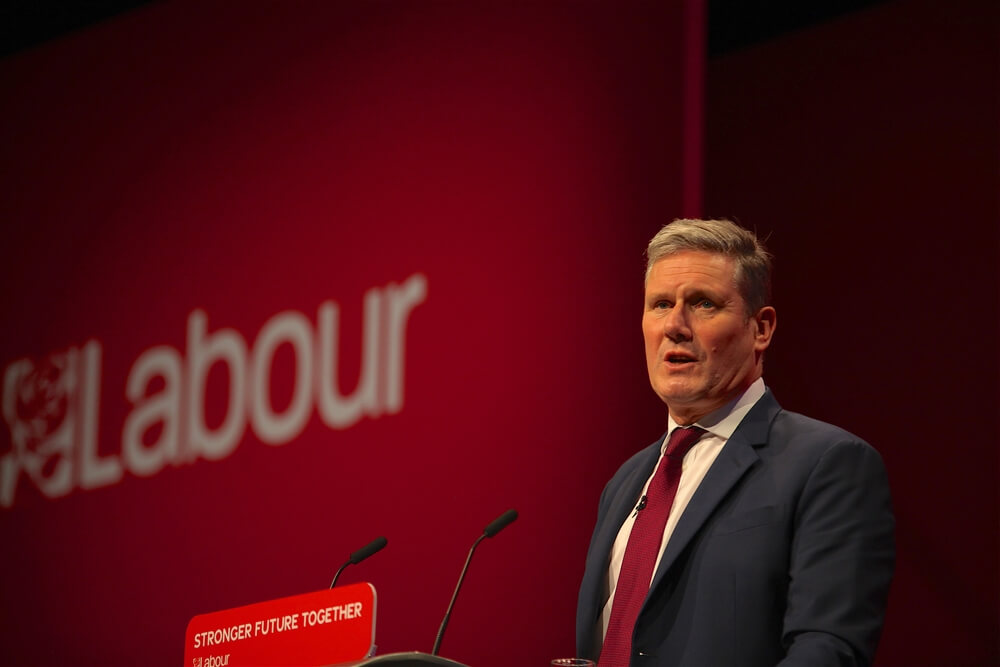Responding to the challenges of an increasingly unstable world, Britain’s two main political parties have matched pledges to boost defence spending while remaining ominously vague about where the money will come from.
With escalating Middle East tensions adding to the threat posed by an unresolved conflict in Ukraine, the international situation appears to some as fragile as at any time since the end of the Cold War.
UK defence secretary Grant Shapps spoke at the start of the year of moving from a post-war to a pre-war world in which old enemies were being reanimated, new foes were taking shape, and battle lines were being redrawn.
Much of the public appear to share his pessimistic view. Although defence figures low down in the list of voters’ short-term priorities, a poll taken shortly afterwards indicated a narrow majority believed a world war was at least somewhat likely within a decade.
Unsurprisingly, Shapps praised the achievements of his own Conservative government in rising to the challenges by investing heavily in modernising the armed forces.
Spending targets
The government’s critics are less confident, accusing it of using some creative accounting to portray cash cuts in the defence budget as an increase in spending in terms of GDP.
Parliament’s cross-party Public Accounts Committee accused the Shapps’ defence ministry of lacking a credible plan, thereby undermining the credibility of the armed forces. Criticism has been directed not just at spending targets but also to how limited resources are assigned.
An open letter signed by 30 former defence officials and cross-party parliamentarians this month warned that inadequate investment threatened British interests, “making the disruption we have experienced in recent months look moderate”.
The signatories urged all political parties to commit to spending at least 2.5 per cent of GDP on defence in each year of the next parliament with a longer-term commitment to reach 3 per cent by 2030.
Both the Conservative government and the Labour opposition have nominally signed off on a 2.5 per cent commitment
Both the Conservative government and the Labour opposition have nominally signed off on a 2.5 per cent commitment within the context of all the other budgetary demands confronting a struggling economy.
Labour leader Keir Starmer, regarded as prime minister-in-waiting ahead of a general election this year, confirmed the target this month, with the proviso that it would be fulfilled “as soon as resources allow”.
That closely reflected the position of the current government. The chancelllor, Jeremy Hunt, offered no immediate boost to defence spending in his March budget, but said it would rise to 2.5 per cent as soon as economic conditions allowed.
The head of the Institute for Fiscal Studies think tank, Paul Johnson, said Hunt’s pledge was “not worth the paper it's written on unless accompanied by some sense of how it will be afforded”.
Trumpist tendencies
Underlying the mounting concerns about the current readiness of the armed forces is a fear of the US retreating from its commitent to the defence of Europe, particularly if Donald Trump is voted back into the White House later this year.
Some UK voters appear to display somewhat Trumpist tendencies when it comes to picking up the bill for European defence. A poll commissioned by the Telegraph newspaper found that just under half of the public believed the UK should protect fellow Nato countries that refused to meet the alliance’s 2.0 per cent GDP spending target.
Philip van Scheltinga, speaking for the firm that undertook the UK poll and similar research in the US, said there was overwhelming support for Nato in both countries. However, “Americans and British voters see Nato as a mutual commitment, not a charity.”
While politicians and analysts are juggling the percentages on defence, UK voters’ attention is largely elsewhere
While politicians and analysts are juggling the percentages on defence, UK voters’ attention is largely elsewhere as they head for what is likely to be a late autumn election.
Concerns about the declining state of public services, the cost of living and the economy at large currently trump worries about the wider state of the world.
That may explain the reticence of both main parties in spelling out more precise defence spending commitments. A diversion of resources from what the electorate sees as its most pressing problems might merely increase existing resentments that European allies are not doing enough.
Global defence alliances
UK already spends more than the Nato target of 2.0 per cent of GDP, ahead of Germany and France, a fellow middle-ranking nuclear power.
Some campaigners for higher defence spending have argued that UK could set an example to its neighbours, which those same neighbours might take as a somewhat patronising view as they wrestle with their own post-Ukraine challenges.
 Keir Starmer has set out his stall by setting a spending target and giving full-throated support to maintaining and renewing the UK’s nuclear deterrent and its role in global defence alliances
Keir Starmer has set out his stall by setting a spending target and giving full-throated support to maintaining and renewing the UK’s nuclear deterrent and its role in global defence alliances
In the short-term an incoming UK government will be unable to ignore its own defence challenges. Starmer has set out his stall by setting a spending target and giving full-throated support to maintaining and renewing the UK’s nuclear deterrent and its role in global defence alliances.
Writing in the Conservative-supporting Mail newspaper, he lampooned the government for having reducing the army to its smallest size since the era of Napoleon. However, he chose to prioritise the opportunities defence modernisation offered the UK’s manufacturing sector, rather than the inevitable cost to its taxpayers.
Perhaps Starmer’s main contribution, assuming he takes office, could be to adopt a closer relationship with European allies on defence as on other shared concerns.
The domestic debate inevitably tends towards the defence of Britain but, as Russia’s invasion of Ukraine underlined, politicians sometimes need to remind the public that the security of one depends on the security of all.